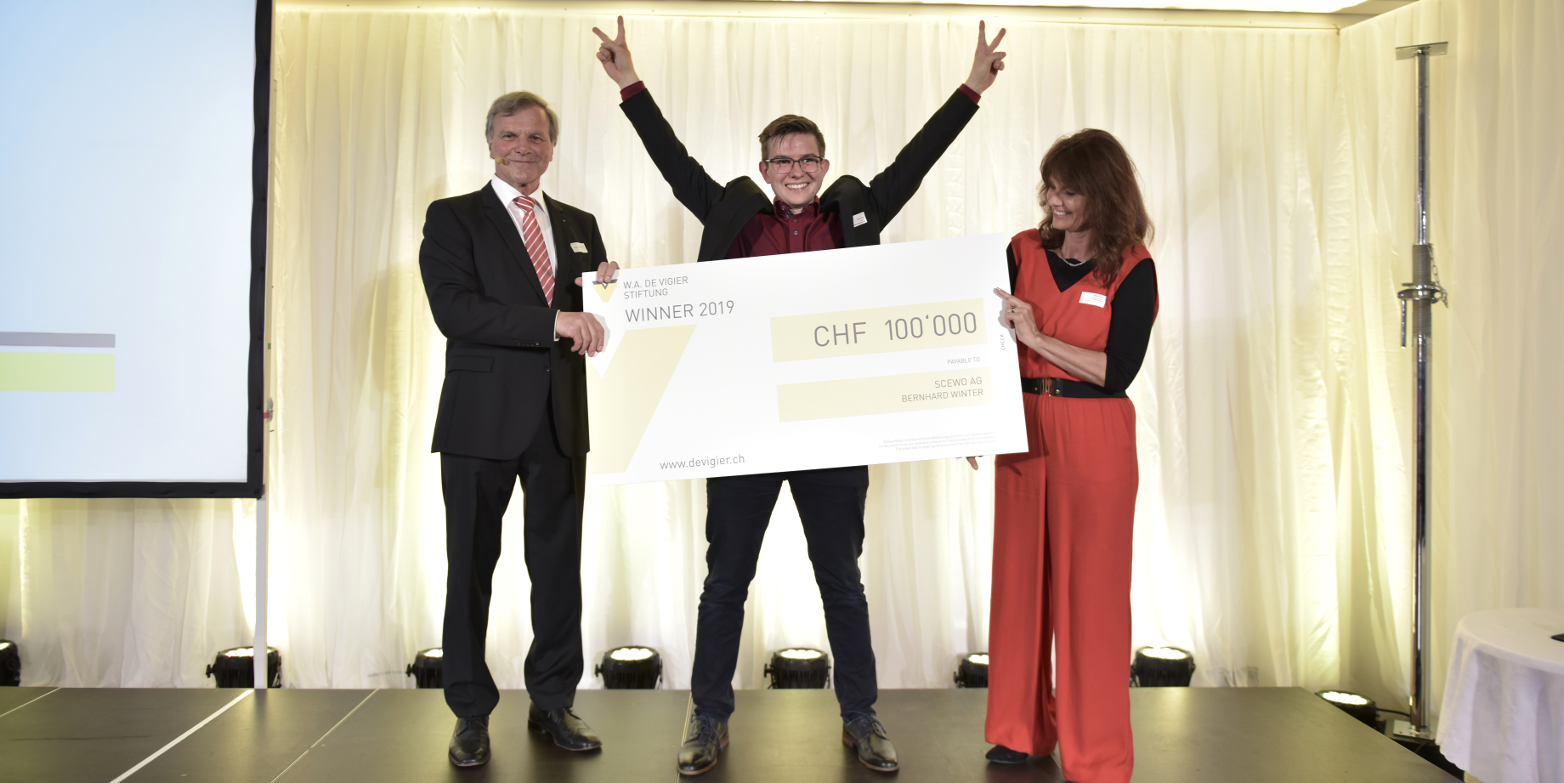Six ETH start-ups receive W.A. de Vigier Prize
To mark its 30th anniversary, the W.A. de Vigier Foundation awarded twice as many start-ups as usual. Six out of ten prizes were won by ETH Zurich start-ups.

When the W.A. de Vigier Prize was awarded for the first time 30 years ago, many of this year’s prize winners were just learning to walk. Back then, nobody was talking about start-up promotion. Bill de Vigier knew from his own experience just how important seed money could be and set his goal to pave the way for young, promising entrepreneurs. He was among the first to institutionalise support for start-ups in Switzerland. For three decades, the W.A. de Vigier Foundation has awarded the highest endowed start-up prize in the country, independently and with no strings attached.
For the first time the jury invited 60 start-ups to pitch
There was another first in the anniversary year 2019: After a preliminary selection, the foundation board got to know 60 young entrepreneurs instead of the usual 16 start-ups. “The ‘Selection Day Top 60’ gave us the chance to get an early sense of the ideas and, in particular, of the people behind the ideas. Our foundation places particular importance on the entrepreneurial personality because we need more pioneers in our country, people like Bill de Vigier. We need real role models who shape our society both with their ideas and their spirit,” says Beat Graf, Vice President of the W.A. de Vigier Foundation. The “Selection Day Top 60” will take place again next year.
Amongst the ten winners are six ETH start-ups: PXL Vision, Scewo, external page Vatorex, PharmaBiome, external page Piomic Medical and external page Sleepiz.
Innovative digital identity verification
Identity fraud and the protection of personal data are huge challenges. PXL Vision AG develops state-of-the-art computer vision and machine learning technologies for fully automated customer onboarding and identity verification using camera-based devices. PXL enables the creation of trusted digital identities which can be used to share personal data and interact in the digital space safely across industries.
A wheelchair that climbs stairs
Scewo AG develops a wheelchair that allows the user to climb stairs and move more freely. Upon approaching steps, two rubber tracks under the wheelchair are extended. The chair’s seat is kept level at all times. The transitions on and off the stairs are automated. The software developers strive to increase the level of automatisation, to help detect critical situations and to drive certain distances autonomously.
Using heat to save the bees
The Varroa mite is a parasite that damages bee colonies in Europe and North America. Until now, beekeepers treated their bees chemically, which unfortunately also damages the bees. Vatorex AG uses the different heat tolerance of mites and bees. With a heating wire embedded directly into the brood combs, the bee brood is heated, which kills the mite. This treatment results in 31 percent improved development of the colony.
Rethinking intestinal therapy
The microbiome is involved in a majority of chronic diseases related to metabolism and the immune system. PharmaBiome AG established a proprietary technology to isolate, culture and characterise gut microbes. Based on the microbes’ functional interaction, the start-up formulates them into pharmaceutical grade mixed cultures to sustainably modulate the gut’s microbiome and thereby treat microbiome-linked diseases.
Wearable wound-healing device
Piomic Medical AG develops a wearable medical device for the treatment of hard-to-heal wounds. Acceleration of wound-healing processes reduces pain and the risk of wound infections, while also increasing the quality of life in patients suffering from chronic wounds. The unique energy-based technology is portable, easy to use and fits seamlessly into the workflow of healthcare professionals.
Medical sleep monitoring from home
With Sleepiz AG’s solution patients can get medically tested for sleep disorders in the comfort of their own homes. The touchless device uses an AI algorithm to capture vital signs and sleep environment data in real time with medical-grade accuracy. The cloud-based solution saves time and money, therefore a higher number of patients can be screened more efficiently for sleep disorders.
About the W.A. de Vigier Award
The W.A. de Vigier Award is the oldest and highest endowed prize for start-ups in Switzerland, giving away five awards of 100,000 Swiss francs each. Over the past 30 years, the foundation has distributed over 11 million francs of seed money. The results are over 90 flourishing start-ups, successful IPOs, multiple company exits and, above all, many newly created jobs.
Comments
No comments yet